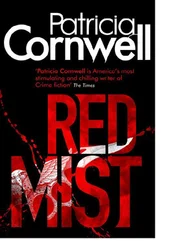He’d taken Georgia Bacardi to High Roller Lanes last June for their six-month anniversary. It was highly unlikely they’d be celebrating their twelfth. Last time they saw each other, first weekend of this month, she hadn’t wanted sex, had about ten different ways to tell him the same thing, which was forget about it. Didn’t feel good, too tired, her job at Baltimore PD was just as important as his, she was having hot flashes, he had other women in his life and she was sick and tired of it. Berger, Scarpetta, even Lucy. Including Barcardi, that was four women Marino had in his life, and the last time he’d had sex was November 7, almost six damn weeks ago.
“The place is beautiful, and so are the women who wait on you while you’re bowling,” he continued. “A lot of them trying to get into show business, modeling, a real upscale clientele, photos of famous people, even in the bathrooms, at least in the men’s room. Did you see any in the ladies’ room?” To Bonnell.
She shrugged, taking off her suit jacket, in case he had any doubt what was under it. He looked. He openly stared.
“In the men’s room there’s one of Hap Judd,” Marino added, because Berger would be interested. “Obviously not the highest place of honor, being on the wall above a urinal.”
“You know when it was taken and if he goes in there a lot?” Berger’s voice.
“Him and a lot of other celebrities who live in the city, or maybe when they’re filming here or whatever,” Marino said. “The inside of High Roller is like a steak house. Photos of famous people everywhere. Hap Judd’s photo might have been taken last summer. No one I talked to could remember exactly. He’s been in there, but he’s not a regular.”
“What’s the attraction?” Berger asked. “I didn’t realize bowling was that big with celebrities.”
“You never heard of Bowling with the Stars?” Marino said.
“No.”
“A lot of famous people bowl, but High Roller Lanes is also a hip hangout,” Marino said, and his thoughts were sluggish, as if the blood had drained out of his head, was flowing due south. “The owner’s some guy who has restaurants, arcades, entertainment centers in Atlantic City, Indiana, South Florida, Detroit, Louisiana. A guy named Freddie Maestro, old as Methuselah. All the celeb photos are with him, so he must spend a lot of time here in the city.”
He pried his eyes away from Bonnell so he could concentrate.
“Point being, you never know who you’re going to meet, is what I’m getting at,” Marino went on. “So, for someone like Toni Darien, maybe that was part of the appeal. She was looking to make money, and tipping is good in there, and she was out to make connections, to hook up. Her shift was what I call prime time. Nights, usually starting around six until closing at two in the morning, Thursday through Sunday. She’d walk to work or take a cab, didn’t own a car.”
He took a sip of Diet Coke, fixing his gaze on the whiteboard on the wall near the door. Berger and her whiteboards, everything color-coded, cases ready for trial in green, those that weren’t in blue, court dates in red, who’s on call for sex crimes intake in black. It was safe staring at the whiteboard. He could think better.
“What type of hooking up are we talking about?” Berger’s voice.
“My guess, in a high-rent place like that you can probably get whatever the hell you want,” Marino said. “So maybe she ran into the wrong person in there.”
“Or High Roller Lanes might have nothing to do with anything. Could be completely unrelated to what happened to her.” Bonnell said what she believed, which was probably why she hadn’t been particularly interested in the photographs or what was playing on the huge video screens over the lanes, or the sightings of the rich and famous.
Bonnell was convinced that Toni Darien’s murder was random, that she was targeted by a predator, a serial killer on the prowl. She might have been dressed for jogging, but that wasn’t what she’d been doing when she’d ended up in the wrong place at the wrong time. Bonnell said Marino would understand better when he heard the 911 call made by the witness.
“I’m assuming we still have no clue about what’s happened to her cell phone and laptop.” Scarpetta’s voice.
“And her billfold and maybe her purse,” Marino reminded them. “Appears they’re missing, too. Not in her apartment. Not at the crime scene. And now I’m wondering about her coat and mittens.”
“The missing items might make sense in light of the nine-one-one call, the information Detective Bonnell received,” Berger said. “What a witness said. Possibly Toni got into a taxi, had those things with her for some reason because she wasn’t out jogging. She was out doing something else, possibly going to make a stop and then jog later.”
“What about any other types of chargers besides ones for the laptop and cell phone?” Scarpetta said. “Anything else in her apartment?”
“That was all I saw,” Marino said.
“What about a USB dock, for example? Anything that might indicate she had some other sort of device that needed charging, such as the watch she had on?” Scarpetta asked. “It appears to be some type of data-collection device called a BioGraph. Neither Lucy nor I can find it on the Internet.”
“How can there be a watch called that and it’s not on the Internet? Someone has to sell it, right?” Marino said.
“Not necessarily.” When Benton answered him, it was always to disagree or put him down. “Not if it’s in research and development or part of a classified project.”
“So maybe she worked for the fucking CIA,” Marino shot back.
If Toni’s murder was a hit by an intelligence-gathering agency, then whoever was responsible wasn’t going to leave a data device on her wrist.
Benton made the point in the flat tone he used when talking to people he really didn’t like. An arid tone, a bland tone, that reminded Scarpetta of parched earth, of stone, as she sat on the sofa inside a guest room he’d converted into his office at the rear of the apartment, a handsome space with a city view.
“Propaganda. To make us think something. In other words, planted,” Marino sounded from the VoiceStation next to Benton ’s computer. “I’m just responding to your suggestion that it might be part of some classified project.”
Benton listened impassively from his leather chair, a wall of books behind him, organized by topic, hardbound, a number of them first editions, some very old. Marino had gotten annoyed and finally had flared up because Benton had made him feel foolish, and the more Marino talked, the more foolish he sounded. Scarpetta wished the two of them would stop acting like adolescent boys.
“So, if you’re going down that road? Then maybe they wanted us to find the watch because whatever’s on it is disinformation,” Marino said.
“Who’s ‘they’?” Benton said in a decidedly unpleasant voice.
Marino no longer felt he had a right to defend himself, and Benton no longer pretended he’d forgiven him. It was as if what had happened in Charleston a year and a half ago was between the two of them and had nothing to do with Scarpetta anymore. Typical of assaults, she no longer was the victim. Everyone else was.
“I don’t know, but truth be told, we shouldn’t discount anything.” Marino’s big invasive voice filling Benton ’s small private space. “The longer you do this, the more you learn to keep an open mind. And we got a lot of shit going on in this country with terrorism, counterterrorism, spying, counterspying, the Russians, the North Koreans, you name it.”
“I’d like to move away from the CIA suggestion.” Berger was no-nonsense, and the turn the conversation had taken was trying her patience. “There’s no evidence we’re dealing with some organized hit that’s politically motivated or related to terrorism or spying. In fact, plenty of evidence to the contrary.”
Читать дальше












